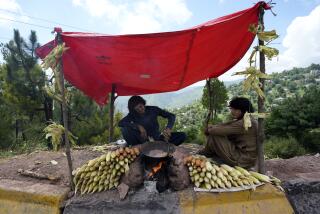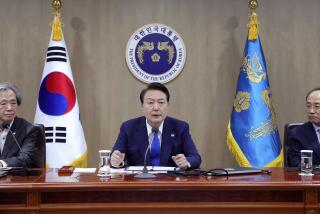IMF Likely to Release $3.5 Billion to S. Korea
- Share via
WASHINGTON — The International Monetary Fund signaled Tuesday that it is satisfied with South Korea’s steps to restructure its economy and will approve the second stage of its $21-billion loan--this one totaling $3.5 billion--on Thursday.
A senior IMF official told reporters that South Korea’s officials “not only have complied vigorously” with the IMF’s demand for economic restructuring, “but they have gone beyond it.”
The IMF statement was clearly intended to bolster confidence in the foreign exchange markets and help stabilize the won, South Korea’s beleaguered currency. President Clinton, in a news conference later, said he too was “very encouraged” by what South Korea had done.
The statement was considered important because until only a day or two ago South Korean officials had been so slow in complying with IMF demands that financial markets had grown concerned that the economic rescue might fall apart. As a result, the won continued to plunge.
Since then, however, South Korea has announced a series of major steps to restructure its economy, including scrapping previous trading limits on the won to let the currency float freely, raising a cap on interest rates and allowing certain foreign takeovers of South Korean firms.
The developments sparked a renewal of confidence in financial markets. The won continued to strengthen Tuesday, closing at 1,425 to the dollar, versus 1,564 on Monday. And the main South Korean stock index surged 4.8% on Tuesday.
But the won weakened by midday today, falling to 1,540, even though stocks rose further, with the main index up 2.9% at 415.85.
IMF officials also confirmed Tuesday that they planned to ask the organization’s 181 member countries to boost its capital base by $160 billion--almost double the amount they had agreed upon in September--to help replenish the monies now being lent to Asia.
The request, however, is not expected to get very far. Both the United States and Germany have indicated they will not support it, at least for now, and other major governments are expected to take a similar position.
IMF officials conceded that shelving the request was not likely to prevent the organization from meeting its commitments in Asia. The immediate benefit of such a boost would have been largely symbolic because the monies would not have been available for several years.
One reason the Clinton administration is lukewarm toward the IMF proposal is that it had trouble persuading Congress to approve the U.S. share of the smaller increase that the world’s finance ministers approved in September.
Clinton reaffirmed at his news conference that he would renew his push for congressional approval of the original increase as soon as lawmakers come back in late January. Also still pending in Congress is a companion plan for a new, supplemental IMF emergency rescue fund.
The $3.5-billion IMF infusion would be added to the $5.5 billion that the agency disbursed when it approved the South Korean economic plan 10 days ago. Although the timing reportedly is coincidental, Thursday is also the day of the South Korean presidential election.
Meanwhile, there were indications that South Korean officials might be close to securing a modest “bridge” loan--possibly from Japan--to help bolster its foreign exchange reserves until the IMF disburses the installment that’s expected to be approved by the IMF’s executive board Thursday.
However, IMF officials indicated Tuesday that if the second installment to the South Korean loan program is approved, the money will eliminate any need for a bridge loan.
The $21-billion loan to South Korea is part of a comprehensive international financial rescue package that includes about $60 billion in credits for the hard-hit South Korean economy, including funds from the World Bank, the U.S. and Japanese governments and other sources.
More Asia Coverage
* Asian woes will slow California’s economic growth next year, reports say. A1
* A $77-billion rescue package for the Japanese banking system. A1
* Despite the turmoil, the commercial real estate market in the Southland should climb, industry watchers say. D6
More to Read
Sign up for Essential California
The most important California stories and recommendations in your inbox every morning.
You may occasionally receive promotional content from the Los Angeles Times.













